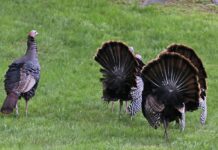“The precept in living pastorally in an industrial society is do not try to make your entire livelihood from the farm, at least not at first. Do like almost all our ancestors did, even in pioneer times: Pay for the land with a job not directly dependent on the farm’s income.
“Even a casual reading of rural history in the nineteenth and early twentieth century shows that almost every farmer financed his initial land purchases by earning money in a hundred different ways — from teaching to blacksmithing to carpentry to working as a hired hand.”
— Gene Logsdon, The Contrary Farmer
I find it amazing, time and time again, how much the world is turning back around to the way it used to be, long, long ago. My great-grandfather Charlie was, as it turns out, a man ahead of his time. He didn’t want to give up his windmill-powered house and barn when electric lines came through.
He felt certain he could continue powering everything his humble farm needed with “free wind” instead of paying for electric power. Grandpa Charlie also held on to his horses, saying he had trained them to do exactly what needed to be done on his farm.
“Who needs a tractor that’s gonna break down and cost you time and money?”
Giving in
There were a few times Charlie had to eat his words. One story, in particular, always makes me grin. Charlie loved his old radio shows, planning his work for a break just in time for Lum and Abner, which always gave him a good belly laugh for the day.
Sometimes, the story line became so complicated that a fellow didn’t dare miss a single word. Well, one day Charlie was forced to hitch up his horses and head to the neighbor’s farm.
“John, I have to know how today’s Lum and Abner ended up,” Grandpa Charlie asked sheepishly.
Neighbor John likely ribbed Charlie for a little bit, because Charlie had certainly dished it out himself many, many times. That precious wind-generated battery had faded away just when Charlie needed it to work the most. Lum had been in a pickle, and Abner was just about to do something big. Grandpa Charlie simply had to know what that was!
Eventually, Grandpa Charlie did bend to the ways of the world, and an electric line was run to his house. He continued to live in a very conservative world, living on what his farm could produce, and to love his horses right up to the bitter end.
Live off the land
By the time I came into the world, Grandpa Charlie was a retired farmer, having held an estate sale after his wife’s death, moving in to a small place behind his daughter’s home in the tiny town of Hayesville.
Grandpa Charlie helped us on our farm, and he would often joke with my dad, his grandson, about the lack of horses on the farm. If a tractor needed mechanical attention, it was a sure opening for Grandpa Charlie to talk about the great horses of his heyday.
When farmers talked about buying additional ground, Grandpa Charlie would just shake his head. He believed farming conservatively, making every inch of ground count, could serve a family just as well.
This is exactly what farmer and writer Gene Logsdon pointed out over and over in his writing. What interests me about the current trend in the world today is that more people are looking to live off the land in a self-sufficient way, including those who have managed to successfully harness wind power to run small, productive farms. Grandpa Charlie certainly must be smiling from ear to ear.














I enjoyed the story of Lum and Abner! It’s my all-time favorite “Old Time Radio Show.” I currently produce the authorized “Lum and Abner” comic strip, complete with an audio adaptation (designed for our blind friends – or for anyone who wants to listen). Everyone is invited to check it out for free.